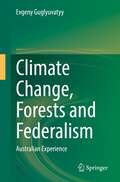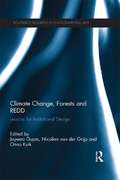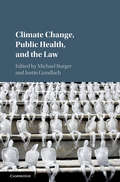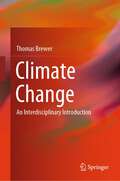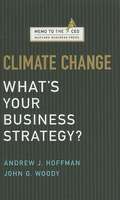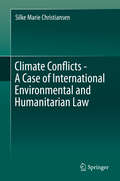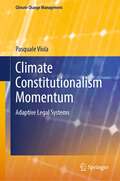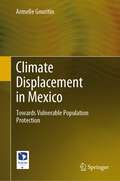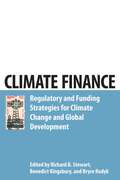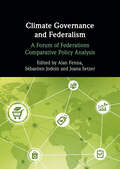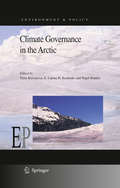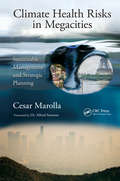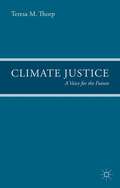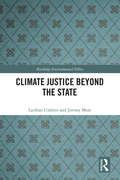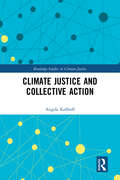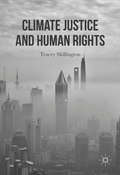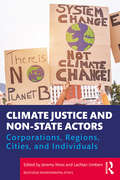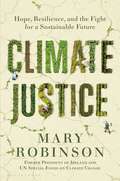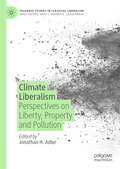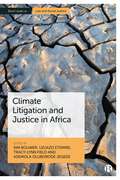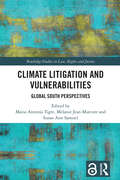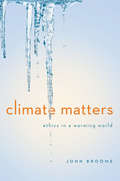- Table View
- List View
Climate Change, Capitalism, and Corporations
by Christopher WrightClimate change is one of the greatest threats facing humanity, a definitive manifestation of the well-worn links between progress and devastation. This book explores the complex relationship that the corporate world has with climate change and examines the central role of corporations in shaping political and social responses to the climate crisis. The principal message of the book is that despite the need for dramatic economic and political change, corporate capitalism continues to rely on the maintenance of 'business as usual'. The authors explore the different processes through which corporations engage with climate change. Key discussion points include climate change as business risk, corporate climate politics, the role of justification and compromise, and managerial identity and emotional reactions to climate change. Written for researchers and graduate students, this book moves beyond descriptive and normative approaches to provide a sociologically and critically informed theory of corporate responses to climate change.
Climate Change, Forests and Federalism: Australian Experience
by Evgeny GuglyuvatyyClimate change is one of the most serious global challenges facing humankind. Climate change has enormous environmental and economic implications, and finding a solution is a daunting task. The purpose of this book is to look at the global problem of climate change through the prism of an individual country's attempt to tackle this problem.This book begins with a discussion of the origins of climate change and the evolution of the international response to climate change. Key climate change mitigation actions and policies are considered to provide the necessary framework for analysing Australia's approach to climate change. Australia's climate change policy development is considered from a historical perspective. The book traces the evolution of the response to climate change, focusing on Australia as one of the Federal countries unable to adequately reduce greenhouse gas emissions due to the systematic failure of the Australian government to develop a common and effective approach to the problem of climate change. The book will be of interest to scholars and students of environmental law and the contemporary International and Australian climate change law.
Climate Change, Forests and REDD: Lessons for Institutional Design (Routledge Research in International Environmental Law)
by Joyeeta Gupta Nicolien van der Grijp Onno KuikA search for new methods for dealing with climate change led to the identification of forest maintenance as a potential policy option that could cost-effectively reduce greenhouse gas emissions, with the development of measures for Reducing Emissions from Deforestation and Forest Degradation (REDD). This book explores how an analysis of past forest governance patterns from the global through to the local level, can help us to build institutions which more effectively deal with forests within the climate change regime. The book assesses the options for reducing emissions from deforestation in developing countries under the international climate regime, as well as the incentives flowing from them at the national and sub national level and examines how these policy levers change human behaviour and interface with the drivers and pressures of land use change in tropical forests. The book considers the trade-offs between certain forestry related policies within the current climate regime and the larger goal of sustainable forestry. Based on an assessment of existing multi-level institutional forestry arrangements, the book questions how policy frameworks can be better designed in order to effectively and equitably govern the challenges of deforestation and land degradation under the global climate change regime. This book will be of particular interest to students and scholars of Law and Environmental Studies.
Climate Change, Public Health, and the Law
by Michael Burger Justin GundlachClimate Change, Public Health, and the Law provides the first comprehensive explication of the dynamic interactions between climate change, public health law, and environmental law, both in the United States and internationally. Responding to climate change and achieving public health protections each require the coordination of the decisions and behavior of large numbers of people. However, they also involve interventions that risk compromising individual rights. The challenges involved in coordinating large-scale responses to public health threats and protecting against the invasion of rights, makes the law indispensable to both of these agendas. Written for the benefit of public health and environmental law professionals and policymakers in the United States and in the international public health sector, this volume focuses on the legal components of pursuing public health goals in the midst of a changing climate. It will help facilitate efforts to develop, improve, and carry out policy responses at the international, federal, state, and local levels.
Climate Change: An Interdisciplinary Introduction
by Thomas BrewerThis textbook introduces and explains the issues around climate change and its mitigation. It includes topics across disciplines and can be used as a single-volume text by students studying a range of subjects. Among the topics included are: ·How to adopt significant mitigation measures now to avoid the most catastrophic long-term consequences of climate change.·Reducing the rates of highly potent, short-lived emissions of methane gas and black carbon particulates—reductions that are necessary to meet the temperature targets of the Paris Agreements.·Implementing wide-ranging adaptation measures to reduce the deaths and economic costs of extreme heat waves, droughts, wildfires, hurricanes, and floods.·Recognizing the unusually rapid warming in the Arctic, which is disrupting weather patterns in the northern hemisphere and currents in the Atlantic Ocean, causing world-wide sea-level rise, and also causing methane leaks in the Arctic region—leaks that could eventually lead to irreversible global warming consequences. Meeting these challenges effectively requires action by both governments and businesses. The book examines the national and local governmental policies—and business practices—that are needed in sector-specific chapters. An objective of the book is to inform readers about specific problems resulting from climate change—and the wide range of potential government policies and business practices, changes in technologies, and changes in public attitudes and actions that can reduce the emissions and otherwise lessen their impacts. Indeed, a central message is that understanding the issues posed by climate change requires no less than an understanding of climate science, micro- and macro-economics, technologies for mitigation and adaptation measures, as well as politics and law at many governmental levels from local to global. The author has included short case studies that illustrate and integrate multiple analytic perspectives. The book is therefore appropriate for students, professionals, and general audiences with wide-ranging interests and backgrounds.
Climate Change: What's Your Business Strategy?
by Andrew J. Hoffman John G. WoodyBelieve or not, climate change is one of the most pressing challenges facing the world today. Most of all, it is quickly becoming a crucial business issue. But how will you and your company respond? You need fast and reliable advice from the world's foremost experts. Climate Change delivers just that: four strategies from two MBA professors with broad and deep experience with environmental issues. Climate Change gives you a first-hand look at how world-class thinkers would react to this pressing issue if they were in your shoes. From our new Memo to the CEO series - solutions-focused advice from today's leading practitioners.
Climate Conflicts - A Case of International Environmental and Humanitarian Law
by Silke Marie ChristiansenThe bookaddresses the question of whether the currently available instruments ofinternational environmental and international humanitarian law are applicableto climate conflicts. It clarifies the different pathways leading from climatechange to conflict and offers an analysis of international environmental lawembedded within the international doctrine of state responsibility. It goes onto discuss whether climate change amounts to an issue covered by Art. 2. 4 UNCharter - the prohibition of the use of force. It then considers the possibleapplication of international humanitarian law to climate conflicts. The bookalso offers a definition of the term "climate conflict", drawing on legal aswell as peace and conflict studies.
Climate Constitutionalism Momentum: Adaptive Legal Systems (Climate Change Management)
by Pasquale ViolaWhile civil society and social movements claim for more effective measures to cope with anthropogenic climate change, legal scholars are witnessing the “aurora” of climate change law. What is quite relevant in this double-process of recognition/establishment is the interdisciplinary nature of such a field of studies, which goes beyond formalistic legal aspects.Based on the need to rethink legal paradigms, “Climate Constitutionalism Momentum: Adaptive Legal Systems” deals with three major means to combat anthropogenic climate change—namely science, politics and law—further addressing the thesis regarding a supposed adaptiveness of legal systems and proposing new pathways for further inquiries on the current climate constitutionalism momentum. The book introduces the international efforts in acknowledging the need for concrete measures to achieve ambitious results, addressing the comparative public law debate, merging theoretical appraisals and quantitative insights under a top-down approach and a civil-law methodology. Furthermore, the book combines theoretical and empirical viewpoints in reference to climate justice and litigation. The last part of the argumentative pattern merges the aforementioned key elements and grounds of investigation, providing an overall account of the current climate constitutionalism momentum.Academic researchers are the book’s primary audience, but it is also targeted for undergraduate and postgraduate students of specific courses. For the numerous insights and the contemporary relevance of the topic, the book is also addressed to political stakeholders and legal practitioners. Given the transnational development of this area of law, the expected audience of the book is global.
Climate Displacement in Mexico: Towards Vulnerable Population Protection
by Armelle GouritinThis book presents the updated results of an investigation carried out in 2019. The National Autonomous University of Mexico’s (UNAM) Climate Change Research Program (PINCC), funded the research coordinated by Armelle Gouritin. The research aims to answer the following questions: Does the Mexican legal framework and public policies address forced internal climate mobility? If not, what could be the elements of a legal framework and public policies to address the phenomenon? As the phenomenon was approached it was clear that it was extremely complex and consisted of numerous tensions that would lead to other questions throughout the research process.Climate forced internal displacement is projected as a huge-scale phenomenon in Mexico. Against this background, the book provides the first critical diagnosis of the current politico-legal Mexican framework and finds it to be lagging behind in terms of prevention and attention. The book analyses the three-level Mexican governance (federal, state and local levels), and identifies serious loopholes according to a rights-based approach that particularly focuses on women, indigenous peoples, and persons and communities with scarce economic resources. The results provide information on up-coming legislative and political processes and provide benchmarks that can be applied in other case-studies, including other national frameworks’ critical analysis.
Climate Finance: Regulatory and Funding Strategies for Climate Change and Global Development
by Richard B. Stewart Benedict Kingsbury Bryce RudykPreventing risks of severe damage from climate change not only requires deep cuts in developed country greenhouse gas emissions, but enormous amounts of public and private investment to limit emissions while promoting green growth in developing countries. While attention has focused on emissions limitations commitments and architectures, the crucial issue of what must be done to mobilize and govern the necessary financial resources has received too little consideration. In Climate Finance, a leading group of policy experts and scholars shows how effective mitigation of climate change will depend on a complex mix of public funds, private investment through carbon markets, and structured incentives that leave room for developing country innovations. This requires sophisticated national and global regulation of cap-and-trade and offset markets, forest and energy policy, international development funding, international trade law, and coordinated tax policy.Thirty-six targeted policy essays present a succinct overview of the emerging field of climate finance, defining the issues, setting the stakes, and making new and comprehensive proposals for financial, regulatory, and governance mechanisms that will enrich political and policy debate for many years to come. The complex challenges of climate finance will continue to demand fresh insights and creative approaches. The ideas in this volume mark out starting points for essential institutional and policy innovations.
Climate Governance and Federalism: A Forum of Federations Comparative Policy Analysis
by Sébastien Jodoin Alan Fenna Joana SetzerThe majority of the world's largest carbon emitters are either federations or have adopted systems of decentralised governance. The realisation of the world's climate mitigation objectives therefore depends in large part on whether and how governments within federal systems can cooperate to reduce carbon emissions and catalyse the emergence of low-carbon societies. This volume brings together leading experts to explore whether federal or decentralised systems help or hinder efforts to mitigate and adapt to climate change. It reviews the opportunities and challenges federalism offers for the development and implementation of climate mitigation and adaption policies and identifies the conditions that influence the outcomes of climate governance. Including in-depth case studies of 14 different jurisdictions, this is an essential resource for academics, policymakers and practitioners interested in climate governance, and the best practices for enhancing climate action. This title is also available as Open Access on Cambridge Core.
Climate Governance in the Arctic (Environment & Policy #50)
by E. Carina Keskitalo Nigel Bankes Timo KoivurovaClimate change is affecting the Arctic environment and ecosystems at an accelerating speed, twice the rate of the global average. This is opening the Arctic to transportation and resource development and creating serious challenges for local communities and indigenous peoples. Climate Governance in the Arctic considers two aspects of climate change from an institutional perspective. It focuses on how relevant regimes, institutions and governance systems support mitigation of climate change. It also examines the extent to which the varying governance arrangements in the Arctic support adaptation and the development of adaptation processes for the region. The book's focus on Arctic governance offers unique insights within climate change mitigation and adaptation research.
Climate Health Risks in Megacities: Sustainable Management and Strategic Planning
by Cesar MarollaClimate Health Risks in Megacities: Sustainable Management and Strategic Planning courageously confronts the immense challenges of alleviating climate change and takes the initiative to layout an agenda that calls for action in the rapidly changing landscape of our global climate. This guide provides a constructive methodology for developing and implementing risk management and operational continuity management systems to climate change effects on urban populations. It addresses key issues such as physical location, proper sanitation, food security and vector-borne diseases against the backdrop of climate change, and then model its effect on the urban dwellers. The author also reveals the benefits of implementing a unique risk management approach to combat global threats and focuses on building urban resilience in the face of disasters. Prepared with a comprehensive and forward-thinking style, this book draws on indispensable case studies in key megacities like New York, Los Angeles, Beijing, Rio de Janeiro, London, Mumbai, and Lagos, and links researchers, scientists, city’s mayors, environmentalists, policy-makers and world leaders from central areas to review, reflect, and expound on future directions.
Climate Justice
by Teresa M. ThorpIn this ground-breaking work, Teresa Thorp tackles the causes and effects of climate injustice by methodically mapping out an approach by which to reach a negotiated consensus with legal force to protect present and future generations. Using the law and policy of climate change as a vehicle for illustrating how to shape our future, she comprehensively overturns the widely held contemporary view of climate justice as inconstant charitable acts, relative systemic notions and static concepts isolated from the common good and a congruent rule of law. Responding to the adverse impacts of climate change (heat waves, extended drought, severe flooding and desertification), which represent an urgent and potentially irreversible threat to human societies and the planet, requires a new and cohesive way of thinking about global policy and the law. The mission of guaranteeing and realising human dignity, human security and human rights is multi-fold. Looking through the lens of kaleidoscopic normativity, an extensible language anchored in common juridical elements should facilitate how norms enter the socio-legal frame and interact within it. Users need to be able to display and interpret the congruent legal norm in order to obey and apply it. Galvanising this process by constitutionalising first principles and consequential norms is vital for attaining fraternity between nations and among all people. Climate Justice - A Voice for the Future is an essential read for scholars, practitioners and all those genuinely interested in reaching consensus on a post-2015 global climate accord, a unified development agenda and a cohesive pact for disaster-risk reduction.
Climate Justice Beyond the State (Routledge Environmental Ethics)
by Jeremy Moss Lachlan UmbersVirtually every figure in the climate justice literature agrees that states are presently failing to discharge their duties to take action on climate change. Few, however, have attempted to think through what follows from that fact from a moral point of view. In Climate Justice Beyond the State, Lachlan Umbers and Jeremy Moss argue that states’ failures to take action on climate change have important implications for the duties of the most important actors states contain within them – sub-national political communities, corporations, and individuals – actors that have been largely neglected in the climate justice literature, to date. Sub-national political communities and corporations, they argue, have duties to immediately, aggressively, and unilaterally reduce their emissions. Individuals, on the other hand, have duties to help promote collective action on climate change. Along the way, they contribute to a range of important contemporary debates, including those over the nature of collective duties, what agents are required to do under conditions of partial compliance, and the requirements of fairness. Targeted at academic philosophers working on climate justice, this book will also be of great interest to students and scholars of global justice, applied ethics, political philosophy, and environmental humanities.
Climate Justice and Collective Action (Routledge Studies in Climate Justice)
by Angela KallhoffThis book develops a theory of climate cooperation designed for concerted action, which emphasises the role and function of collectives in achieving shared climate goals. In debates on climate change action, research focuses on three major goals: on mitigation, on adaptation and on transformation. Even though these goals are accepted, concerted action is still difficult to realize. Climate Justice and Collective Action provides an analysis of why this is the case and develops a theory of climate cooperation designed to overcome the existing roadblocks. Angela Kallhoff starts with a thorough analysis of failures of collective action in the context of climate change action. Taking inspiration from theories of water cooperation, she then establishes a theory of joint action that reframes climate goals as shared goals and highlights the importance of adhering to principles of fairness. This also includes an exploration of the normative claims working in the background of climate cooperation. Finally, Kallhoff puts forward proposals for a fair allocation of duties to cooperate with respect to climate goals. This book will be of great interest to students and scholars of climate action, climate justice, environmental sociology and environmental philosophy and ethics more broadly.
Climate Justice and Disaster Law
by Rosemary LysterClimate disasters demand an integration of multilateral negotiations on climate change, disaster risk reduction, sustainable development, human rights and human security. Via detailed examination of recent law and policy initiatives from around the world, and making use of a capability approach, Rosemary Lyster develops a unique approach to human and non-human climate justice and its application to all stages of a disaster: prevention; response, recovery and rebuilding; and compensation and risk transfer. She comprehensively analyses the complexities of climate science and their interfaces with the law- and policy-making processes, and also provides an in-depth analysis of multilateral climate change negotiations under the 1992 United Nations Framework Convention on Climate Change.
Climate Justice and Historical Emissions
by Meyer Lukas H. Pranay SanklechaThis volume investigates who can be considered responsible for historical emissions and their consequences, and how and why this should matter for the design of a just global climate policy. The authors discuss the underlying philosophical issues of responsibility for historical emissions, the unjust enrichment of the earlier developed nations, as well as questions of transitional justice. By bringing together a plurality of perspectives, both in terms of the theoretical understanding of the issues and the political perspectives on the problem, the book also presents the remaining disagreements and controversies in the debate. Providing a systematic introduction to the debate on historical emissions and climate change, this book provides an unbiased and authoritative guide for advanced students, researchers and policymakers in climate change justice and governance, and more widely, for anyone interested in the broader issues of global justice.
Climate Justice and Human Rights
by Tracey SkillingtonThis book shows that escalating climate destruction today is not the product of public indifference, but of the blocked democratic freedoms of peoples across the world to resist unwanted degrees of capitalist interference with their ecological fate or capacity to change the course of ecological disaster. The author assesses how this state of affairs might be reversed and the societal relevance of universal human rights rejuvenated. It explores how freedom from want, war, persecution and fear of ecological catastrophe might be better secured in the future through a democratic reorganization of procedures of natural resource management and problem resolution amongst self-determining communities. It looks at how increasing human vulnerability to climate destruction forms the basis of a new peoples-powered demand for greater climate justice, as well as a global movement for preventative action and reflexive societal learning.
Climate Justice and Non-State Actors: Corporations, Regions, Cities, and Individuals (Routledge Environmental Ethics)
by Jeremy MossThis book investigates the relationship between non-state actors and climate justice from a philosophical perspective. The climate justice literature remains largely focused upon the rights and duties of states. Yet, for decades, states have failed to take adequate steps to address climate change. This has led some to suggest that, if severe climate change and its attendant harms are to be avoided, non-state actors are going to have to step into the breach. This collection represents the first attempt to systematically examine the climate duties of the most significant non-state actors – corporations, sub-national political communities, and individuals. Targeted at academic philosophers working on climate justice, this collection will also be of great interest to students and scholars of global justice, applied ethics, political philosophy and environmental humanities.
Climate Justice: Hope, Resilience, and the Fight for a Sustainable Future
by Mary RobinsonHolding her first grandchild in her arms in 2003, the author was struck by the uncertainty of the world he had been born into. Before his fiftieth birthday, he would share the planet with more than nine billion people-people battling for food, water, and shelter in an increasingly volatile climate. The faceless, shadowy menace of climate change had become, in an instant, deeply personal. This book is a stirring manifesto on one of the most pressing humanitarian issues of our time, affirmative, and well-argued case for hope.
Climate Liberalism: Perspectives on Liberty, Property and Pollution (Palgrave Studies in Classical Liberalism)
by Jonathan H. AdlerClimate Liberalism examines the potential and limitations of classical-liberal approaches to pollution control and climate change. Some successful environmental strategies, such as the use of catch-shares for fisheries, instream water rights, and tradable emission permits, draw heavily upon the classical liberal intellectual tradition and its emphasis on property rights and competitive markets. This intellectual tradition has been less helpful, to date, in the development or design of climate change policies. Climate Liberalism aims to help fill the gap in the academic literature examining the extent to which classical-liberal principles, including an emphasis on property rights, decentralized authority and dynamic markets, can inform the debate over climate-change policies. The contributors in this book approach the topic from a range of perspectives and represent multiple academic disciplines. Chapters consider the role of property rights and common-law legal systems in controlling pollution, the extent to which competitive markets backed by legal rules encourage risk minimization and adaptation, and how to identify the sorts of policy interventions that may help address climate change in ways that are consistent with liberal values.
Climate Litigation and Justice in Africa
by Kim Bouwer, Uzuazo Etemire, Tracy-Lynn Field and Ademola Oluborode JegedeEPDF and EPUB available Open Access under CC-BY-NC-ND licence. In recent years, climate litigation has become an important subject of global scholarly and policy interest. However, developments within the Global South, particularly in Africa, have been largely neglected. This volume brings together an international team of contributors to provide a much-needed examination of climate litigation in Africa. The book outlines how climate litigation in Africa is distinct as well as pinpointing where it connects with the global conversation. Chapters engage with crucial themes such as human rights approaches to climate governance, corporate liability and the role of gender in climate litigation. Spanning a range of approaches and jurisdictions, the book challenges universal concepts around climate and the role of activism (including litigation) in seeking to advance climate governance.
Climate Litigation and Vulnerabilities: Global South Perspectives (Routledge Studies in Law, Rights and Justice)
by Maria Antonia Tigre Melanie Jean Murcott Susan Ann SamuelThis volume explores climate litigation as a means to tackle the rights and socio-ecological, intergenerational, gender, racial, and other justice implications of the ever-growing vulnerability to climate change, whilst critically engaging with the notions of vulnerability and intersectional climate justice.With insightful analysis, thought-provoking case studies, and a global perspective, the collection illustrates the opportunities and pitfalls of litigation pursued by people from the Global South who face intersecting forms of oppression and marginalisation amidst the climate crisis. Contributors discuss litigation strategy, novel legal arguments, institutional barriers, and unique socio-ecological and political challenges in the Global South. Divided into two parts, the book recognises that climate change is an existential threat to humanity more frequently being tackled in courts worldwide. The first part exposes the limits of litigation as a mechanism for intersectional climate justice for vulnerable people in the Global South. The second part highlights innovations in climate litigation in pursuit of intersectional climate justice.The book will be of interest to academics, researchers, and policymakers in the areas of human rights law, environmental law, climate law, Latin American studies, South Asian studies, and African studies.
Climate Matters: Ethics in a Warming World (Norton Global Ethics Series)
by John BroomeA vital new moral perspective on the climate change debate. Esteemed philosopher John Broome avoids the familiar ideological stances on climate change policy and examines the issue through an invigorating new lens. As he considers the moral dimensions of climate change, he reasons clearly through what universal standards of goodness and justice require of us, both as citizens and as governments. His conclusions--some as demanding as they are logical--will challenge and enlighten. Eco-conscious readers may be surprised to hear they have a duty to offset all their carbon emissions, while policy makers will grapple with Broome's analysis of what if anything is owed to future generations. From the science of greenhouse gases to the intricate logic of cap and trade, Broome reveals how the principles that underlie everyday decision making also provide simple and effective ideas for confronting climate change. Climate Matters is an essential contribution to one of the paramount issues of our time.

